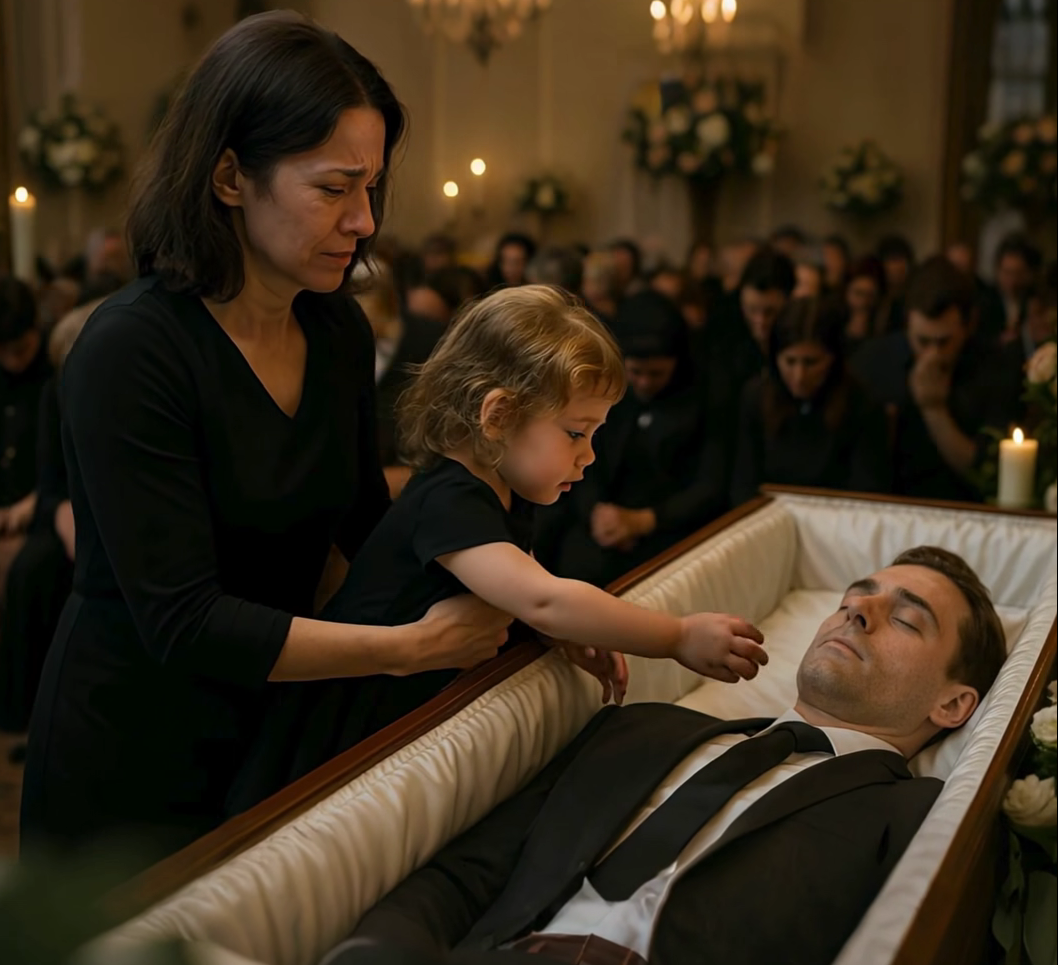The night of my father’s wake is a night I’ll never forget — not because of the tears, or the flowers, or the silence that filled every corner of the room, but because of what my eight-year-old sister did after everyone thought the mourning was over.
Her name is Lily, and she had always been the quiet one — the kind of child who watched rather than spoke, who listened even when she pretended not to. But after Dad’s accident, something in her changed. It wasn’t the loud kind of grief. It was still, almost eerie — like she was hearing something the rest of us couldn’t.

The Wake
The wake took place in the small funeral parlor across from our home — a white building with old carpets and too many flowers. The air was heavy with the smell of lilies and wax, the kind of scent that clings to your clothes long after you’ve left.
Dad’s coffin stood in the middle of the room, surrounded by candles. His face was peaceful, almost too peaceful, as though someone had painted calm over the fear that used to live in his eyes.
Lily stood right beside him the whole time.
She didn’t cry. She didn’t move. She just stared.
The adults whispered behind their hands that she was “in shock,” that children “don’t understand death.” But they were wrong. Lily understood it better than any of us. She was studying it.
When the ceremony ended and people started to leave, Mom gently told her it was time to go home. Lily didn’t respond. She just kept looking at Dad, her fingers tracing the edge of the coffin like she was memorizing it.
Two relatives had to lift her away. She didn’t scream. She didn’t fight. She just let them take her, her eyes still fixed on him.
That was the last moment I thought the night would be normal.
The Uneasy House
Back home, silence sat heavy in every room. Mom kept wiping her eyes even though no tears came anymore. My stepmother, Rebecca, said almost nothing — just poured herself a glass of water and stared out the window.
She’d only been in our lives for three years, but things with Dad had grown complicated in the months before he died. They argued often, behind closed doors, in low tones that ended with slammed drawers or broken plates. I used to hear Dad muttering things like “this can’t go on,” or “I’ll handle it soon.”
At sixteen, I was old enough to recognize fear in a man’s voice — especially my father’s.
That night, Mom stayed in the guest room to avoid being alone. Rebecca went upstairs early. I helped Lily change into her pajamas, expecting her to crawl into her own bed. But instead, she climbed into mine.
She didn’t say a word.
She lay stiff under the blanket, clutching the photo of Dad from the wake. Her small hand gripped it so tightly that her knuckles turned white.
“Lily,” I whispered. “It’s okay to cry.”
No answer. Not even a blink. Just the sound of her breathing — slow, steady, unnatural.
I must have drifted off sometime after midnight, but when I woke, the bed beside me was empty.
The Empty Bed
The light under her door was on.
I pushed it open. Empty.
Then I saw it — the front door downstairs, hanging slightly open. The cold night air crept in, carrying the smell of wet grass.
My heart started to pound. I didn’t even stop to grab shoes.
Outside, the gravel crunched under my bare feet as I ran toward the funeral home across the street. The building stood dark and silent except for a faint glow from inside.
The door was unlocked.

The Coffin Room
Inside, everything looked exactly as it had during the wake — the candles, the flowers, the stillness. Only now, the silence felt wrong.
That’s when I saw her.
Lily was lying inside the coffin beside our father, her small head resting against his chest. Her eyes were open but calm, her fingers clutching the sleeve of his suit.
“Lily!” I whispered, stepping forward — but before I could reach her, I froze.
There was someone else in the room.
Rebecca.
She stood at the foot of the coffin, her hands trembling, her eyes locked on Lily.
“What are you doing here?” I hissed.
She didn’t answer. Her face was white, her breathing shallow. Then Lily’s lips moved.
“Daddy said… it’s okay now,” she whispered softly.
Rebecca’s expression changed — not shock, but fear. The kind that sinks deep into the bones.
“No,” she muttered. “No, she knows.”
The Confession
For a long moment, no one moved. The candles flickered, throwing shadows that seemed to breathe on the walls.
“What are you talking about?” I demanded.
Rebecca turned toward me, her eyes glossy. “You shouldn’t be here,” she said quietly.
“Neither should you,” I shot back. “What’s going on?”
But before she could speak, Lily looked up — right at her.
“Daddy said you were sorry,” she murmured.
Rebecca staggered back as though struck. Her hand went to her mouth. “Stop,” she said, shaking her head. “You don’t understand.”
Lily’s voice was so calm it didn’t sound like hers anymore. “He said you didn’t mean to push him.”
The room fell silent.
I felt my throat close. “What did she say?” I asked, even though I’d heard it.
Rebecca began to sob — quiet at first, then uncontrollable. “It was an accident,” she whispered. “We were arguing by the stairs. He grabbed my arm, I pulled away — he fell. I didn’t mean to—”
Her words crumbled into silence.
I looked at Lily. She hadn’t moved. Her small hand still rested on Dad’s chest, but her eyes were full of something strange — not anger, not sadness. Understanding.
“It’s okay,” she said softly. “He forgave you.”
The Morning After
By dawn, the police were there.
Rebecca didn’t deny what she’d said. They found the bruises on her arm that matched Dad’s grip, the broken banister where he’d fallen, the security footage showing her dragging his body into the car before calling for help.
She confessed to everything.
They said she’d panicked — that she wanted to stage it as a car accident.
Mom was silent through it all. She didn’t even ask questions. She just held Lily close, whispering, “It’s over now.”
But it wasn’t over. Not really.
What Lily Remembered
Weeks later, when things had quieted down, I asked Lily what had happened that night — why she went back to the funeral home.
She looked at me for a long time before answering.
“Daddy wasn’t gone,” she said. “He was waiting. He said I had to help him tell the truth.”
I didn’t know what to say.
“Did you dream it?” I asked.
She shook her head. “No. He talked to me. Just like he used to when he tucked me in.”
Her tone was so steady, so matter-of-fact, that I almost believed her.
Almost.
The Weight of Knowing
Even now, years later, I still wake up sometimes to the memory of that night — the smell of lilies, the cold air on my feet, the sight of my sister lying beside our father’s body like she belonged there.
I’ve told myself a hundred versions of the story. Maybe she overheard something. Maybe she guessed. Maybe grief made her see things that weren’t there.
But then I remember Rebecca’s face — pale, trembling, terrified — and the way she said those words like a confession she’d been running from:
“No… she knows.”
Sometimes I wonder if Lily ever truly let go of that night. She’s grown now — quiet as ever, still carrying a gentleness that feels almost otherworldly.
She doesn’t talk about Dad anymore, but every year on the anniversary of his death, she visits the grave alone and leaves a single white lily.
When I ask why, she just smiles and says, “He still talks to me sometimes.”
And maybe he does.
Because the night she lay beside him, the truth came back to life.
And once a truth like that wakes up, it never really dies again.
News
VACC supports driver’s complaints vs Rhian, Michelle, Samantha
(Left photo) Rhian Ramos, Samantha Panlilio, and Michelle Dee are facing accusations of torture and serious illegal detention filed by…
Are Katrina Halili and Kris Lawrence Back Together? Netizens Go Wild Over Viral Video That Rekindles Old Flames
One video. A few smiles. A familiar chemistry.And suddenly, the internet is asking the question everyone thought was long buried…
atrina Halili and Kris Lawrence were “together again” in a sweet moment, causing Katie Halos to shed tears of happiness.
Together Again: Katrina Halili, Kris Lawrence, and a Reunion That Spoke of Healing and Family In the world of entertainment,…
FROM SILENCE TO EXPLOSION: Robin Padilla Lays the Cards on the Table, PBBM Faces Political Turmoil!
From Silence to Open Discourse: Robin Padilla Speaks Out as PBBM Faces a Defining Political Moment In politics, silence can…
THE UNIFORM THAT BEGAN THE AWAKENING
The entire living room was silent when I entered. Not because anyone was impressed— but because no one noticed me…
ANG TAHIMIK NA PANALO: …Ngumiti lang si Lisa.
Hindi siya sumagot agad. Hindi niya tinanggihan. Hindi rin niya ipinagtanggol ang sarili. Basta dahan-dahan lang siyang humigop ng iced…
End of content
No more pages to load












